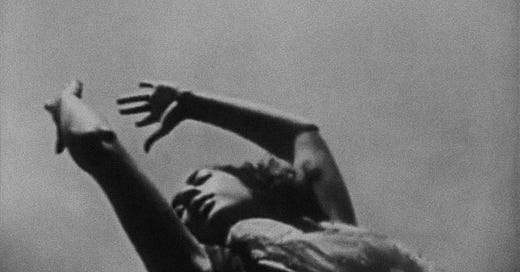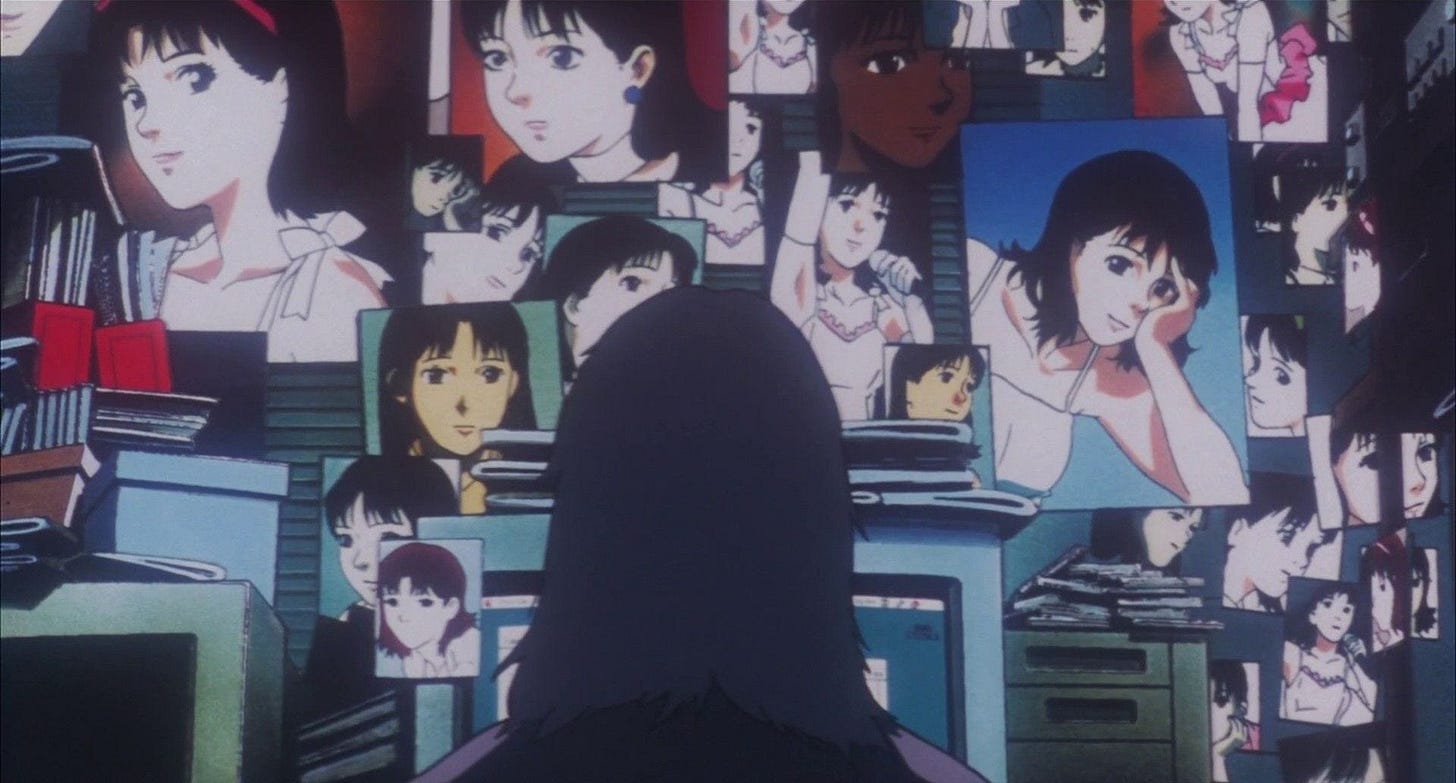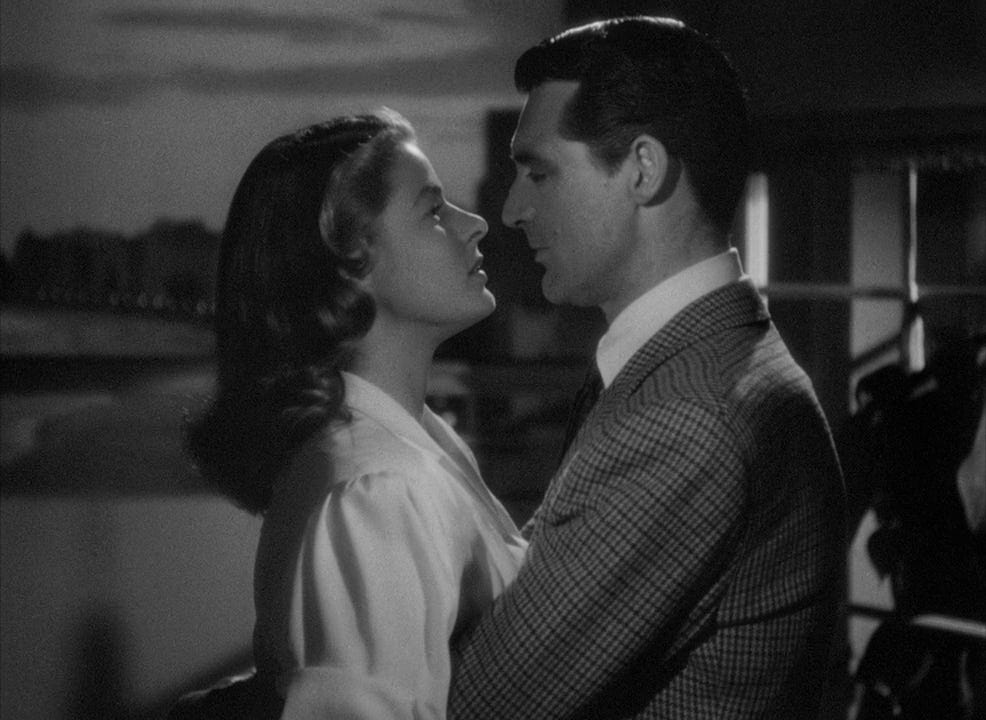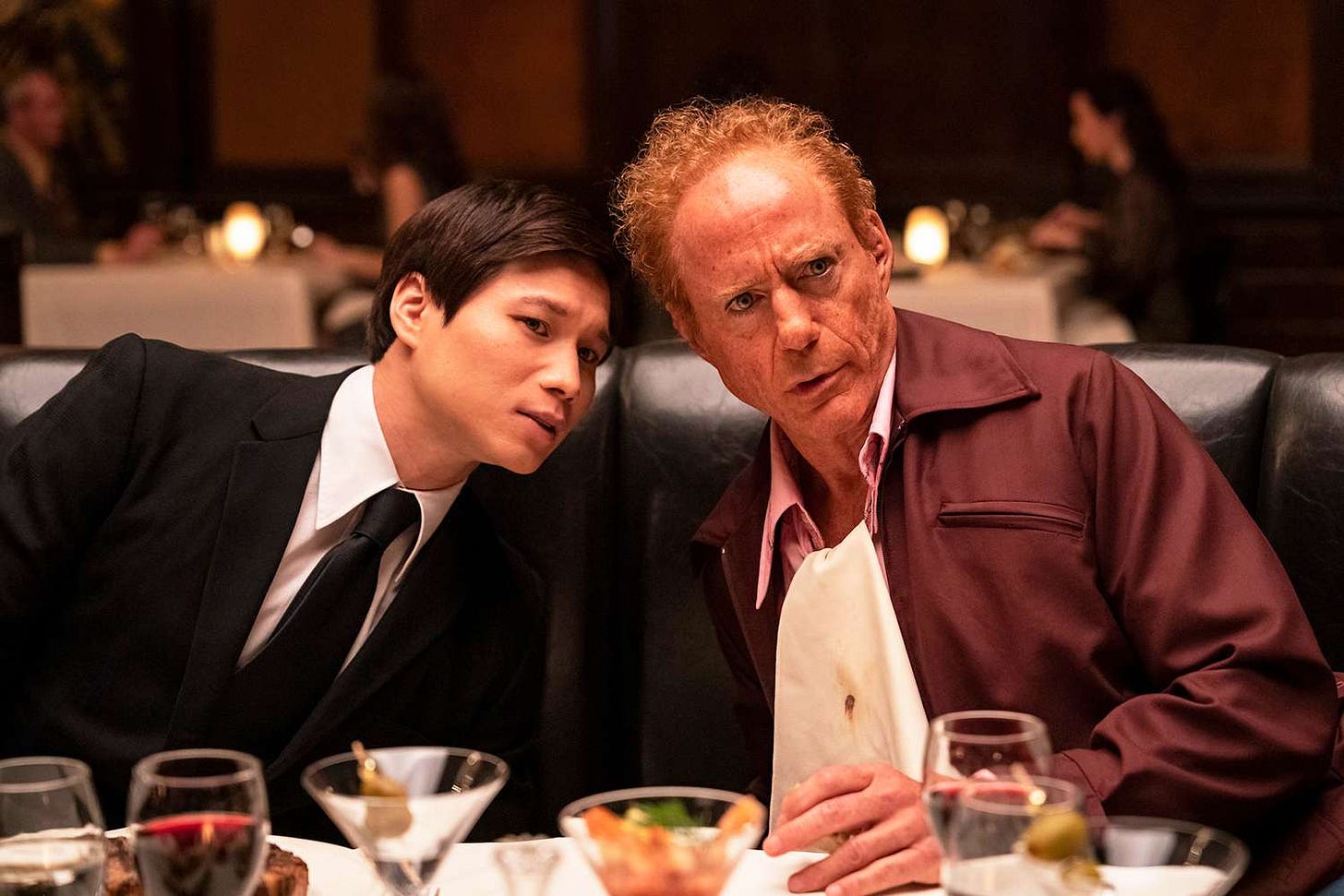I’ve been in a bit of a lull lately.
I’m getting ready to graduate in two weeks, so I’m wrapping up a lot of things in my apartment and college town and slowly making my way to the end.
I’ve also been watching a lot of movies.
If you follow me on Letterboxd, you can see that I’m constantly watching movies. I work as a projectionist, I’m finishing up film school, and I enjoy going to the movies. I’m watching a lot of things. As I prepare to end film school, and thus, am mourning the inevitable loss, I’ve been watching a lot more movies for fun. I’ve gotten into the habit of going to the library and picking up Blu-rays and DVDs and spending my weekends watching new movies.
Here are some recent movies I’ve watched for business and pleasure.
A Ritual in Transfigured Time (Deren 1946)
Maya Deren was an experimental filmmaker before we had the term experimental film. Deren’s unique perspective on film as a manipulation of time is the focus here. Deren’s subject jumps between settings and liminal locations telling a story that isn’t really a story. I watched a trio of Deren films recently, and this one stood out to me as my favorite. The way the subjects move and the way the camera photographs them is mesmerizing. Deren understood film as a form of poetry. She thought of her work as an artist and as a filmmaker as a synthesis between the vertical and the horizontal. Space was vertical and time was horizontal. Her work was both. If we think of film as this constant relationship between shifting images (twenty-four frames per second), Deren’s work constantly swaps out and replaces those images for the next movement and the next setting.
Ritual in Transfigured Time is available to watch on Kanopy.
Perfect Blue (Kon 1997)
“Well... How do you think you know that person you were a second ago is the same person you are now? A continuous stream of memories. Given only that, we all create illusions within ourselves, saying that we each have only one fixed persona.”
Would you believe me if I told you this was Satoshi Kon’s debut film? This is his debut film. I put off this movie for way too long and I finally got a chance to see it when I projected it and I haven’t stopped thinking about it since then. Kon is so prescient in an age before social media and before internet fandom. The concepts of self and the disillusion of self that occurs in this film are so on point and at times truly harrowing. Kon never lets you know what is true and what is fake and it leaves the viewer in awe and shock by the end. Everyone should go see this film.
Perfect Blue is available to stream on Shudder or to rent via AppleTV or Amazon Prime.
Notorious (Hitchcock 1946)
“This is a very strange love affair.”
“Why?”
"Maybe the fact you don’t love me.”
I’ve been on a bit of a Hitchcock kick recently. One weekend I watched three Hitchcock movies in a day and by the time Jimmy Stewart said “Did you think you were God, Brandon?” at the end of Rope (1948), Brandon and I were having a panic attack.
That day I started my Hitchcock binge with Notorious, one of the first films Hitchcock made in America. I said in my Letterboxd review, that the problem with watching a new Hitchcock movie is that every time I find a new favorite Hitchcock movie. That was especially true for this film. But, after watching it, I don’t think anything could unseat it. Ingrid Bergman is at her best as a naïve, unwilling spy, hopelessly in love with Cary Grant. This performance is so controlled and so passionate, that it’s so easy to fall in love with her and root for her. It is easy to argue that she is the protagonist of this film, a rarity in the Hitchcock oeuvre.
This is easily Cary Grant’s best dramatic role. It outshines his work in other Hitchcock movies and any non-comedies he performs in. Grant is controlled and manipulative, but you feel his love for Bergman at every turn. He’s horribly mean, but so directly focused, and still with the trademark Grant earnestness. He’s in top form here.
Hitchcock’s actual directorial work is masterful. This movie is a masterpiece. The blocking, the writing, the lighting, all of it works so well. The camerawork floored me to the point that I had to go search for the documentary short on the Criterion edition specifically about the cinematography. My thoughts on it can be summed up in this text I sent to my friends while watching this movie.
“guys….i CANNOT find a screencap
but there is a shot in this movie of ingrid bergaman and cary grant kissing (but the hitchcock breathing close to each other hayes code way), and her right hand is grabbing his face. he grabs her head to pull her closer and she reaches up with her LEFT to cup his face and her wedding ring is center frame….OH THATS CINEMA”
What a fucking movie man.
Notorious is not available to stream or on VOD, so I recommend going to your local library and finding it on DVD or Blu-Ray. The Criterion restoration is gorgeous.
The Sympathizer (2024)
Robert Downey Jr. and an almost entirely unknown, majority Vietnamese ensemble star in a TV series directed by Park Chan-wook (Old Boy, Decision to Leave), based on the 2015 Pulitzer Prize winner novel by Viet Than Nguyen? Say less. I’m sold. I’m already present. The movie theatre employees are telling me to leave because this is a tv show on HBO.
Viet Than Nguyen’s The Sympathizer is one of my favorite books, and easily one of the best books of the last ten years. When it was announced that Park Chan-wook would be adapting the novel for television, I couldn’t possibly be more excited.
This show follows Hoa Xuande (Cowboy Bebop) as The Captain, a Vietnamese operative working for the US during the American War in Vietnam and after the fall of Saigon.
As of writing, there are three episodes out, and it’s one of the best things I’ve seen on television in a long time. Park Chan-wook makes great TV, shocker.
The Sympathizer airs on HBO on Sunday nights and streams on Max.
So, Morgan, you’ve been watching all of these movies (and one TV show) how have you had time to read things?
Hahahaha. I haven’t. At least not as much as I would like to.
So here’s a couple of things I have read.
The One Hand (2024) by Ram V and Laurence Campbell
A neo-noir futuristic detective story, reminiscent of Blade Runner, done in only the way Ram V (The Many Deaths of Leila Starr, Detective Comics) could do.
The One Hand follows Detective Ari Nassar, who is on the brink of retirement, when his greatest foe, the serial killer The One Hand, resurfaces. The problem? Nassar has put away The One Hand — twice. This series is told in conjunction with the series The Six Fingers (written by Dan Watters with art by Sumit Kumar). The One Hand follows Nassar, while The Six Fingers follows his criminal. As Armaan Babu put it for ComicsXF, “the who of this crime does not matter so much as the why of it — and to a slightly lesser extent, the how.” It’s a brilliant noir story and one I’ve highly enjoyed reading month to month.
Ultimate Spider-Man (2024) by Johnathan Hickman and Marco Checchetto
Did you guys know that Spider-Man comics could be good? Did you guys know that the Ultimate Universe could be interesting? Did you guys know that married with kids PeterMJ could be interesting?
Johnathan Hickman (House of X/Powers of X, East of West) knew that. He knew something we did not. At this point, I should not doubt anything Johnathan Hickman writes (his other current Marvel series, G.O.D.S., is another one of my favorites). What Hickman did to first destroy the Ultimate universe in 2015’s Secret Wars and then rebuild it last year with Ultimate Invasion was a stroke of genius. In Ultimate Spider-Man, Hickman reworks all of the Spider-Man mythos from the ground up.
Twenty years ago, The Maker prevented a radioactive spider from biting a young Peter Parker. He likewise prevented the creation of any other super heroes and formed a secret council to rule the world from the shadows.
In a quest to free the world from The Maker’s Council, Tony Stark, sent Peter — now married father of two — a package containing the same radioactive spider and a pinotech suit.
After watching his uncle, Ben Parker, and mentor J. Jonah Jameson leave the Daily Bugle over pressure from the Bugle’s owner Wilson Fisk, to control the news cycle, Peter felt the call to adventure and let the spider bite him…
We are a far cry from sixteen-year-old dweeby Peter and a dead Uncle Ben. But we are right where we belong with great power and great responsibility. This is a Peter who is just as anxious and uncertain about his place in life. This is a Peter who had his destiny ripped from him. Peter Parker, twenty years after he would have been forced to become Spider-Man, chooses to become Spider-Man.
At its best, this comic reads like some of my favorite Spider-Man fanfiction. The pieces and characters are still there (the Bugle, Harry Osborn, Gwen Stacy — alive!), but the plots are just slightly skewed. At its absolute best, this comic reads like Johnathan Hickman is writing with the skill many comic writers could only dream of. He is a master of his craft. Not only does he understand what makes a compelling superhero comic, Hickman has cracked the formula for bringing Spider-Man to the 21st century. Peter Parker needed to grow up. He needed to become forty, and he needed to settle down. That slight shift in the status quo was something Spider-Man fans, myself included, have been begging for for years. Last February I wrote about my dreams for Peter — I wanted to see him retire, or at least see him grow up. The regurgitated mid-twenties plots (like in the current main title Amazing Spider-Man run) were starting to bore me. Since I’m now closer in age to Peter than I was when I first encountered him, I want to grab him by his shoulders and tell him to snap out of it!
Ultimate Peter is ready to snap into it. To borrow a phrase from one of my former comic book store co-workers, Peter has grown weary. Spider-Man is his mid-life crisis. His great responsibility is providing for his family and providing for the city of New York.
What a great comic. I can’t believe it exists.
Fan Fiction by Tavi Gevinson
“Mostly I am shocked. I had no idea you harbored so many judgments toward me. What I find especially heartbreaking and lonely is that we could’ve found each other again, could’ve had a real friendship. Instead, you have chosen the story.”
This zine by writer and actress Tavi Gevinson (and the accompanying lithub analysis piece) has prompted a series of discussions amongst my friend, Fern, and me about the nature of satire and the point of auto-fiction. There is certainly a longer essay about the rise of autofiction and memoir centered around this piece. But for now, I will say that, in this piece Gevinson blurs the line between fiction and memoir, writing a satirical look at her own relationship with global superstar, Taylor Swift. Gevinson and Swift met when Gevinson was a teenager, and she uses that meeting to spill out into this seventy-three-page zine about the nuances of teenage fandom, the reality of celebrity, and the satire of trying to “know” someone famous. In light of Swift’s new album The Tortured Poet’s Department, in which she eviscerates her fandom, Fan Fiction forces the reader to sit back and process their own feelings towards fandom and celebrity.
As you ask “Who’s afraid of little old me?” or try to locate The Black Dog pub, give yourself time to sit with this piece.
Penance by Eliza Clark
“Even short lives are complex and rich. Even dead children are full of contradictions and flaws and mysteries that will never be fully understood or solved. Even a writer as well versed in this genre as I could never create a perfect photograph of my subject. I could create a beautiful, accurate sketch of Joni, but a sketch from a skilled artist is still a sketch.”
Continuing the trend of auto-fiction/fake memoirs, Eliza Clark’s sophomore novel, Penance is the fictional telling of a non-fictional true crime book. From the jump, with an in-universe editorial note, you find out that the book you are reading was pulled from shelves and journalist Alec Z. Carelli is under investigation for unethical journalistic practices.
Carelli’s book is attempting to be the definitive investigation of the murder of sixteen-year-old Joni Wilson, who was brutally murdered by three of her classmates in a seaside English town. What follows is a critique and satirization of mid-2010s internet culture, the true crime industrial complex, and US serial killer culture.
Clark has a perfect finger on the pulse. This book feels haunting, prescient, and at times horrifying. I know girls like the ones that killed Joni. I have heard podcasts that make fun of horrific murders like Joni’s. Penance encourages the readers to look in-depth into their own behaviors while asking broader questions about whether it is ethical to report on these things at all.
Rapid Fire What I’ve Been Listening To:
Mutant Studies 101
Surprise! I started a podcast with my friend Dean! It’s about the X-Men and about looking at X-Men comics as an academic text.
Cowboy Carter
Duh.
Blame My Ex
“She’s a fire sign/and I don’t even know what that means.” I do!! I sure do!!
Don’t Forget About Me
Maggie wrote the breakup album of the spring (a position I’ll defend with my life!)
Good Luck, Babe!
Lesbian listening to Chappell Roan? Likely thing for them to do.
Until the next time! Good luck, babes!!









